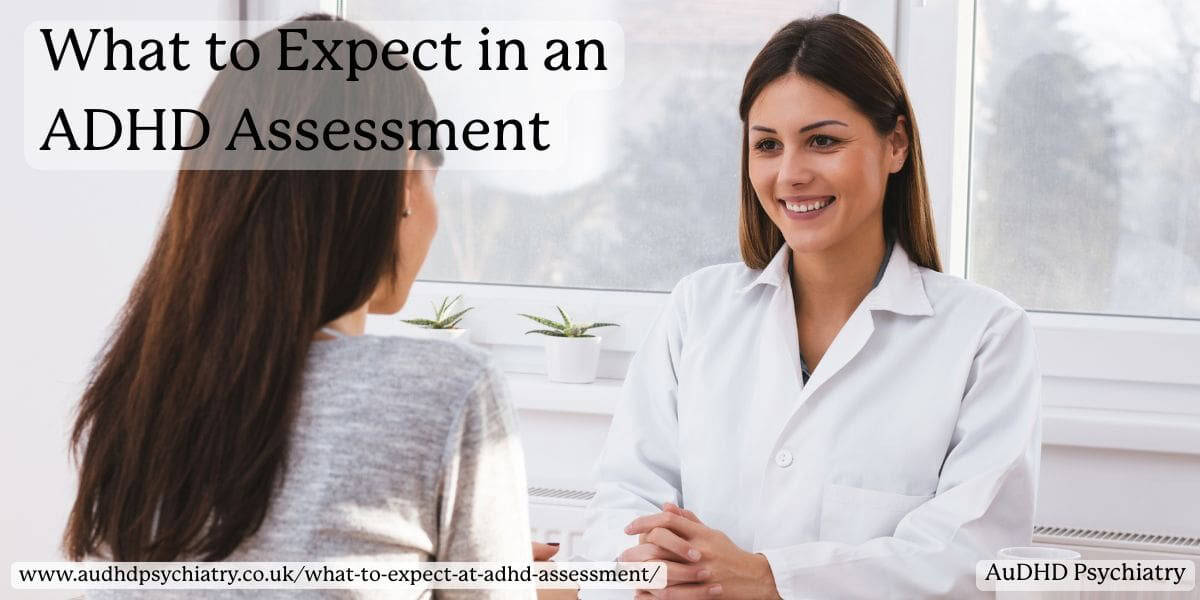
Ever walked out of a meeting, lecture, or conversation thinking, “I was here, but I don’t recall what occurred”? Or found yourself constantly starting things you never finish, no matter how much you want to? For many, these moments feel random, but for some, they’re part of a bigger picture: ADHD.
An ADHD assessment is a monumental step to help you find answers. It’s a structured process where a trained healthcare professional examines your symptoms, life history, and challenges to see if they meet the official diagnostic criteria for attention deficit hyperactivity disorder. If you’re also considering broader evaluations, neurodivergent assessments can help identify additional conditions that may be affecting your life.
This evaluation can explain lifelong patterns, open the door to individualised treatment, and give you tools to thrive. In this guide, you’ll discover exactly what happens during an ADHD assessment, how to prepare, and what comes next, so you can approach it with clarity and confidence.
(Shameless plug: learn more about our confidential ADHD evaluations and free feel to reach out to us today!)
What Is an ADHD Assessment?
An ADHD assessment is a thorough evaluation designed to determine whether or not your experiences or symptoms meet the diagnostic criteria for ADHD. It goes beyond a quick online ADHD screening test. Instead, it is a structured, multi‑step evaluation process carried out by trained healthcare professionals who specialise in neurodevelopmental conditions.
The goal is to achieve an accurate diagnosis by examining your core symptoms, medical history, and how these difficulties affect your daily life across different settings such as work, school, and home. This includes identifying inattentive symptoms, hyperactive‑impulsive symptoms, and any similar symptoms caused by other mental health conditions or medical conditions.
During the assessment, the clinician may conduct a clinical interview, use standardised ADHD rating scales, and review third‑party input from family members, close friends, or teachers. They may also request school records or old report cards to understand long‑term patterns.
Terminology can vary:
- ADHD evaluation – the full process from initial consultation to diagnosis.
- ADHD consultation – the initial appointment to gather key information and determine next steps.
- Formal diagnosis of ADHD – the conclusion reached after the assessment, based on recognised standards such as the American Psychiatric Association’s Diagnostic and Statistical Manual of Mental Disorders, Fifth Edition (DSM‑5) or the World Health Organization’s ICD‑10/ICD‑11.
Who Can Diagnose ADHD in the UK?
In the UK, only specific medical professionals are qualified to provide a formal diagnosis of ADHD. This includes psychiatrists, specialist ADHD nurses, and clinical psychologists with appropriate training in ADHD diagnostic evaluation. While a primary care provider or GP can identify symptoms and refer you for further assessment, they cannot usually confirm an ADHD diagnosis themselves.
ADHD assessments can involve a multidisciplinary team. This may include mental health professionals, neurodisability specialists, and other clinicians working together to ensure a thorough evaluation. A team approach can help identify co‑occurring mental health disorders such as anxiety, sleep disorders, or mood disorders, and rule out alternative explanations for the symptoms.
ADHD Screening vs Full Assessment
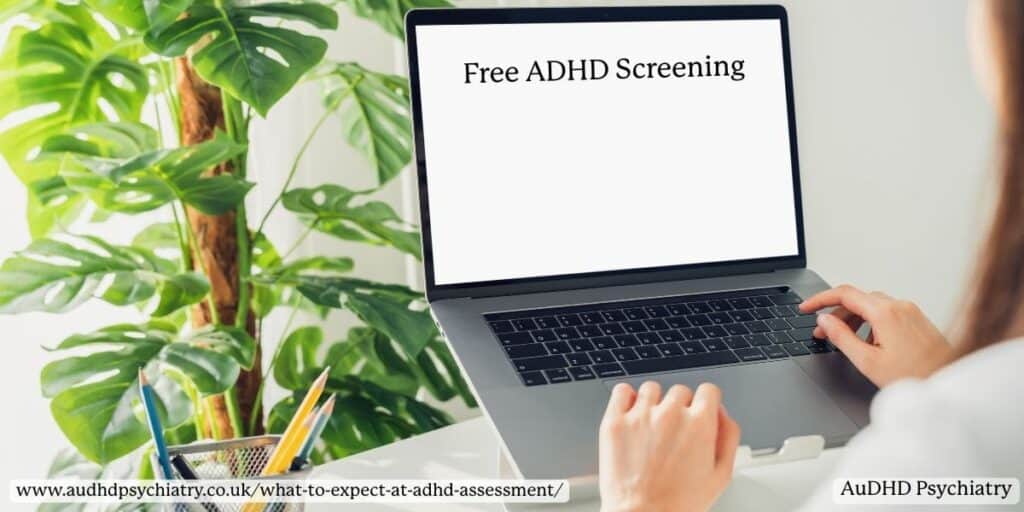
What Happens in an ADHD Screening
An ADHD screening is a preliminary step used to identify whether your symptoms might warrant a full ADHD assessment. Screenings often involve brief questionnaires or structured conversations about your symptoms of inattention, hyperactivity‑impulsivity, and how they impact daily life. Tools like the Adult ADHD Self‑Report Scale (ASRS) or the Conners’ Rating Scales may be used, but these are not diagnostic on their own.
Why Screening Alone Isn’t Enough
While screening can help you and your healthcare provider decide whether further investigation is needed, it cannot provide an accurate diagnosis. ADHD shares similar symptoms with other mental health disorders, such as anxiety disorders or sleep disorders, so a thorough evaluation process is required to confirm the diagnosis of ADHD and rule out alternative explanations. For further guidance, see understanding the ADHD diagnosis journey.
Online ADHD Screening Tests
You can take an ADHD screening test online, and these can help you recognise patterns worth discussing with a healthcare professional. However, online tools should only be seen as a starting point. They cannot replace the comprehensive assessment process carried out by qualified mental health professionals.
When and Why ADHD Evaluations Are Performed
People often pursue a comprehensive ADHD evaluation when they notice persistent challenges with time management, organisation, or impulsive behaviours. For some, difficulties in academic performance or maintaining focus at work prompt the first step towards assessment. Parents may seek testing if a child’s symptoms of ADHD are affecting schoolwork, social skills, or daily routines.
Life Stages for Diagnosis
ADHD can be identified at any stage of life. While many diagnoses occur in childhood, it is increasingly recognised in young people, older adolescents, and adults. Late diagnosis is common, especially in individuals with inattentive type ADHD, where symptoms may have been overlooked or mistaken for personality traits.
Signs It’s Time to Consider an Evaluation
If symptoms are causing significant disruption in your daily life, relationships, or work performance, it may be time to book an ADHD evaluation. Other red flags include struggling with consistent forgetfulness, difficulty finishing tasks, or frequent restlessness. Seeking assessment can lead to an accurate diagnosis and open up access to effective treatment options and lifestyle changes.
NHS vs Private ADHD Assessment Options
The most common route for an ADHD assessment in the UK is through the NHS by speaking with your GP. Your primary care provider will review your concerns, explore your medical history, and, if appropriate, refer you to an NHS ADHD service or a child and adolescent mental health service (CAMHS).
The main benefit of this pathway is that it is free of charge. However, waiting times can be lengthy, often ranging from several months to over two years, depending on local demand. During this period, you may be asked to complete ADHD rating scales or provide school records to support the diagnostic process.
NHS via Right to Choose
If you live in England and your GP agrees to refer you for an ADHD evaluation, you may be eligible for the NHS Right to Choose scheme. This allows you to select an alternative NHS‑approved provider with shorter waiting lists while remaining under NHS care.
To use this option, you must be registered with a GP in England, and the chosen provider must offer ADHD assessments under Right to Choose. Benefits include reduced wait times and greater choice of assessment location or online options.

Private ADHD Assessment
A private ADHD assessment offers faster access, often with appointments available within weeks. Costs typically range between £500 and £1,500, depending on the provider and level of service.
A comprehensive private assessment usually includes:
- A 1:1 clinical interview with a qualified healthcare professional
- Standardised ADHD testing tools
- Review of medical history, family history, and relevant documents
- A detailed written report with diagnosis and treatment recommendations
At AuDHD Psychiatry, we offer private ADHD assessments for adults and young people without the need for a GP referral. Appointments are available online with flexible scheduling, including evenings and weekends. We aim to provide a fast, thorough evaluation so you can begin treatment and support as soon as possible.
Preparing for Your ADHD Assessment
Gather Medical and Personal History
Prepare a thorough summary of your medical background, noting any past mental health conditions, physical conditions, or injuries such as a brain injury that could influence symptoms. Information about your family history of ADHD or other neurodevelopmental conditions can also be valuable.
Collect Supporting Documentation
Useful documents include school records, old report cards, workplace performance reviews, and reports from teachers or other professionals. Feedback from family members or close friends can provide additional context on how symptoms affect different areas of your daily life.
Complete Pre‑Assessment Questionnaires
You may be asked to fill in ADHD rating scales, symptom checklists, or lifestyle questionnaires before your appointment. These help the clinician identify patterns and prepare for the diagnostic interview. At AuDHD Psychiatry, we send these forms in advance so you can complete them at your own pace, ensuring nothing important is missed.
Organise Your Notes and Observations
Prepare a clear summary of your symptoms of inattention, hyperactive‑impulsive symptoms, and any similar symptoms that concern you. Note how these affect academic performance, work responsibilities, relationships, and time management. If you are assessed with us, our clinicians guide you through this process, making it easier to present your experiences clearly during the appointment.
What Happens During the Assessment?
Pre‑Appointment Preparation
Before your appointment, you will have completed pre‑assessment questionnaires, ADHD rating scales, and any relevant symptom checklists. At AuDHD Psychiatry, we provide these in advance so you have time to reflect and gather accurate information. If needed, you will also have the opportunity to submit school records, workplace reports, or third‑party feedback from family members or close friends.
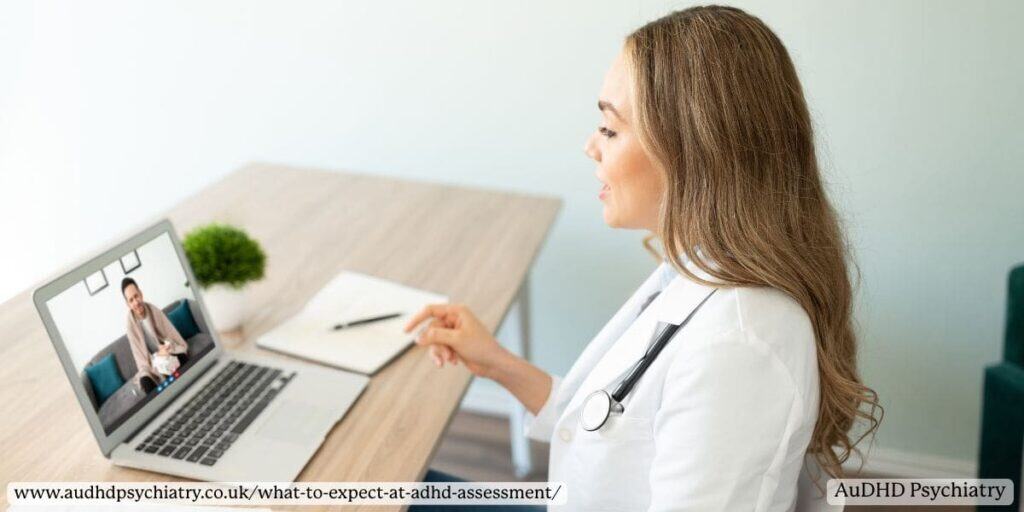
Clinical Interview
The assessment begins with an in‑depth clinical interview conducted by a qualified healthcare professional. This is designed to explore your core symptoms of inattention, hyperactive‑impulsive symptoms, and any similar symptoms that may be linked to other mental health conditions. We also review your medical history, family history, and details about how ADHD symptoms affect your daily life in different settings, such as home, school, or work.
Standardised Diagnostic Tools
To ensure a thorough evaluation, our clinicians use evidence‑based tools such as the DIVA‑5 (Diagnostic Interview for ADHD in Adults), Conners’ Rating Scales, and the Adult ADHD Self‑Report Scale (ASRS). We currently focus on adult ADHD assessments, but for children and young people, parent and teacher input is gathered alongside age‑appropriate ADHD rating scales.
These tools help identify patterns that align with the diagnostic criteria for ADHD as stated in the DSM‑5 or the World Health Organization’s ICD‑10/ICD‑11.
Observations and Accessibility Considerations
We recognise that everyone presents differently. Our clinicians take into account verbal and non‑verbal cues, organisation style, and overall presentation during the appointment. For those with accessibility needs, AuDHD Psychiatry offers flexible online assessments, screen‑sharing for forms, breaks during sessions, and the option for evening or weekend appointments.
Our Step-by-Step ADHD Assessment
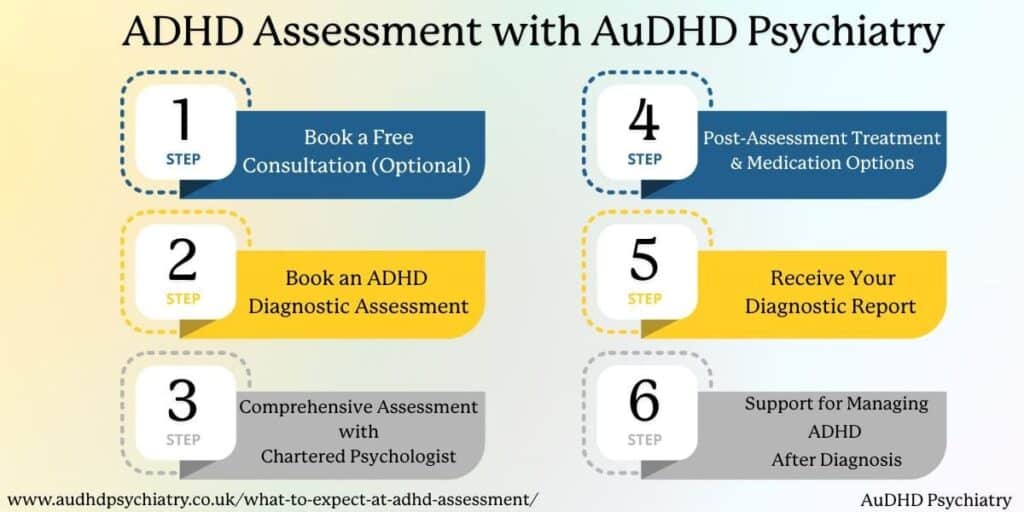
At AuDHD Psychiatry, our ADHD assessment process is designed to be clear, supportive, and thorough from start to finish. You can begin with an optional free consultation to discuss your concerns and learn about the process. When you’re ready, you’ll book an ADHD diagnostic assessment, followed by a comprehensive evaluation with a chartered psychologist using evidence-based tools.
After your assessment, we’ll discuss treatment and medication options tailored to your needs. You’ll then receive a detailed diagnostic report outlining findings and recommendations. Finally, we provide ongoing support to help you manage ADHD effectively, ensuring you have the right strategies and guidance for daily life. Our process is designed to give you a clear pathway from assessment to medication, making each step straightforward and supportive.
Understanding the Results and Next Steps
At AuDHD Psychiatry, we arrange a dedicated feedback appointment soon after your assessment. Typically, you will receive your results within one to two weeks. Your clinician will explain whether your symptoms meet the diagnostic criteria for ADHD and, if so, which type of ADHD is present (inattentive type, hyperactive‑impulsive type, or combined type).
If You Receive a Diagnosis
A formal diagnosis is followed by a detailed written report outlining your core symptoms, assessment findings, and recommendations. We discuss treatment options, which may involve ADHD medication, therapy as needed, lifestyle changes, or a combination of approaches. Where appropriate, we can provide onward referrals or work with your GP to coordinate shared care for prescription management.
If You Do Not Receive a Diagnosis
If your symptoms do not meet the ADHD criteria, your clinician will explain why and may recommend further assessments for other mental health disorders or other medical conditions that could be yielding similar symptoms. You will still receive a comprehensive report with suggested next steps and support options.
Moving Forward
Regardless of the outcome, we aim to ensure you leave the process with clarity and a clear plan. This may include strategies for time management, referrals to ADHD support groups, workplace or academic accommodations, or a personalised treatment plan to support you in managing your symptoms and enhancing your daily life.
Speaking with Your GP About ADHD

How to Ask for an Assessment
If you suspect you may have ADHD, your first step within the NHS is usually to speak with your GP. When booking your appointment, be clear about wanting to discuss an ADHD assessment. Come prepared with specific examples of symptoms of inattention, hyperactive‑impulsive symptoms, or similar symptoms that have affected your daily life across different settings. Mention any long‑standing challenges, such as time management difficulties, impulsive behaviours, or problems with academic performance and work responsibilities.
It can help to bring supporting evidence, such as school records, workplace reports, or feedback from family members and close friends. This gives your GP a more complete picture and strengthens your case for a referral to an NHS ADHD service .
If Your GP Is Unsure or Dismissive
Some GPs may be unfamiliar with the current ADHD diagnostic criteria or may attribute symptoms to other mental health concerns. If this happens, you can ask for a second opinion or request to be referred under the NHS Right to Choose pathway, provided you are registered with a GP in England.
What if Your GP Won’t Refer You?
If your GP declines to refer you for ADHD testing, you still have options. You can:
- Request a second opinion from another GP in the same practice or a different practice
- Use the NHS Right to Choose to access approved providers with shorter wait times
- Book a private ADHD assessment directly with a clinic like AuDHD Psychiatry, where no GP referral is required and appointments are available within weeks
What if There’s No ADHD Service in Your Area?
Some regions in the UK do not have a dedicated ADHD service. In these cases, you can ask your GP to refer you to a national provider through Right to Choose, or explore private assessment options. We offer online assessments for adults and young people across the UK, eliminating geographical barriers and providing flexible appointment times.
Risks, Myths, and Misunderstandings
Concern About Overdiagnosis
One common concern is that ADHD is overdiagnosed. In reality, research suggests that many individuals, particularly women, older adults, and those with inattentive type ADHD, remain undiagnosed. A thorough evaluation process using recognised diagnostic standards, such as the DSM‑5 or ICD‑11, helps ensure an accurate diagnosis of ADHD and reduces the risk of misdiagnosis.

Medication Hesitancy
Some people hesitate to seek an ADHD assessment due to worries about ADHD medication. Although medication can play an important role in effective treatment, it is never the only choice. At AuDHD Psychiatry, treatment plans are personalised to individual needs and may include behavioural therapy, lifestyle changes, and non‑medication approaches alongside or instead of stimulant medicines.
Misunderstanding the Diagnostic Process
Another myth is that ADHD can be diagnosed through a single test. In reality, the assessment process involves multiple steps, including a clinical interview, ADHD rating scales, review of medical history and family history, and consideration of similar symptoms caused by other mental health disorders or medical conditions.
Clarifying the Role of ADHD Assessment
An ADHD assessment is not about labelling someone but about understanding patterns of behaviour and cognitive function. This allows for targeted support, whether through treatment options, workplace accommodations, or educational adjustments. A well‑conducted assessment from a qualified health care professional ensures you receive an accurate diagnosis and a clear treatment plan.
Resources and Support
Trusted ADHD Organisations and Charities
Once you have received a diagnosis of ADHD, or even if you are still in the assessment process, accessing reliable information and peer support may greatly improve symptom management. In the UK, trusted organisations provide evidence‑based information, practical tools, and helplines for further assistance.
Online Communities and Support Groups
Peer support is invaluable for understanding daily life with ADHD. Online forums, social media groups, and local meet‑ups can offer advice, encouragement, and practical tips for symptom management. Many ADHD support groups also run virtual meetings, which can be particularly helpful if mobility, distance, or time constraints make in‑person attendance difficult. For additional structured support, services like adult ADHD coaching can provide personalised strategies to help manage focus, organisation, and daily routines more effectively.
Practical Tools and Self‑Management Apps
Digital tools can help manage core symptoms such as inattentive symptoms, impulsive behaviours, and time management difficulties. Options include:
- Task and reminder apps (e.g. Todoist, TickTick) for structuring daily routines
- Pomodoro timers for improving focus
- Journaling apps for tracking symptoms and lifestyle changes
- Habit trackers for reinforcing positive behavioural changes
These tools are most effective when used alongside a treatment plan developed with a qualified healthcare professional.
Professional Guidance and Continued Care
A diagnosis is just the first step. Ongoing support from healthcare providers ensures that your treatment plan evolves as your needs change. At our clinic, we offer follow‑up consultations, ADHD medication reviews, and behavioural therapy recommendations. We focus on helping you implement strategies that work in different settings, from home and school to the workplace.
For more resources and tools to help you thrive with ADHD, check out this article.
What to Expect at ADHD Assessment: Conclusion
An ADHD assessment is more than a series of tests. It is the first step towards understanding the challenges that may have affected your daily life for years. Through a structured evaluation process, qualified healthcare professionals can identify core ADHD symptoms, rule out similar symptoms caused by other mental health conditions, and provide an accurate diagnosis based on recognised diagnostic criteria.
Whether you choose the NHS route or a private ADHD assessment, the benefits are: clarity, a tailored treatment plan, and access to strategies that can improve focus, time management, and overall quality of life.
If you’re ready to take the first step, book your ADHD assessment with AuDHD Psychiatry. Our thorough evaluations, flexible online appointments, and personalised care mean you can move forward with confidence, clarity, and the right support.
Learn tips and techniques to boost focus and organisation in our blog on Study Hacks for ADHD: Techniques That Actually Work (and Why).
You Might Also Like
Contact Us
We’re here to answer any questions you might have.
Get in Touch
Opening Hours
Contact Form
We’re here to help. Reach out and we’ll get back to you within 24 hours (Monday – Friday).

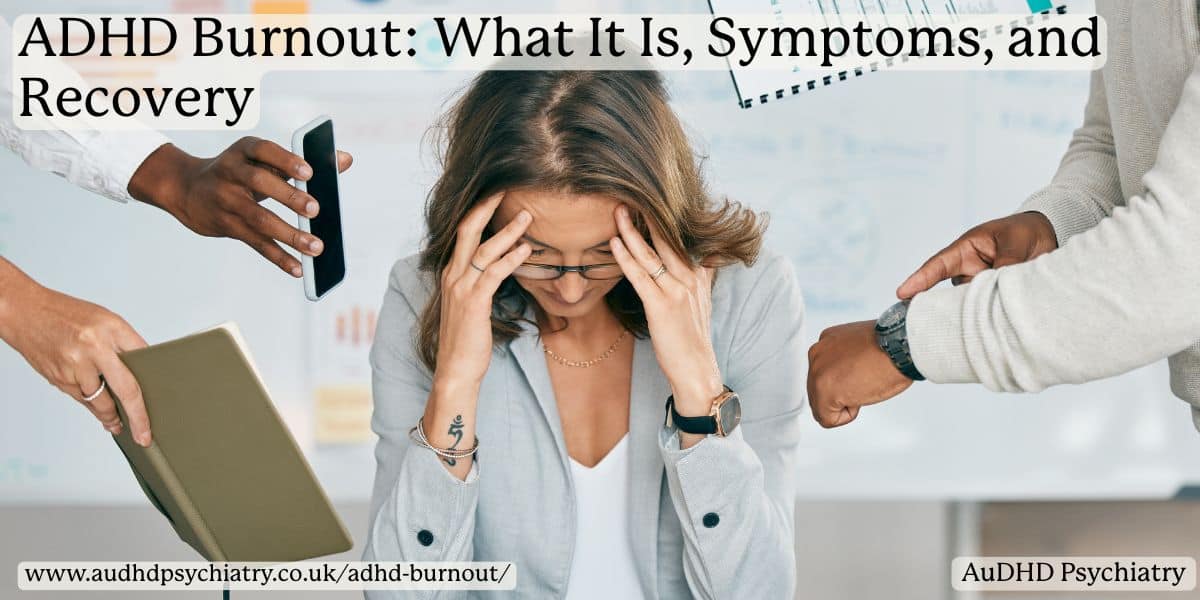
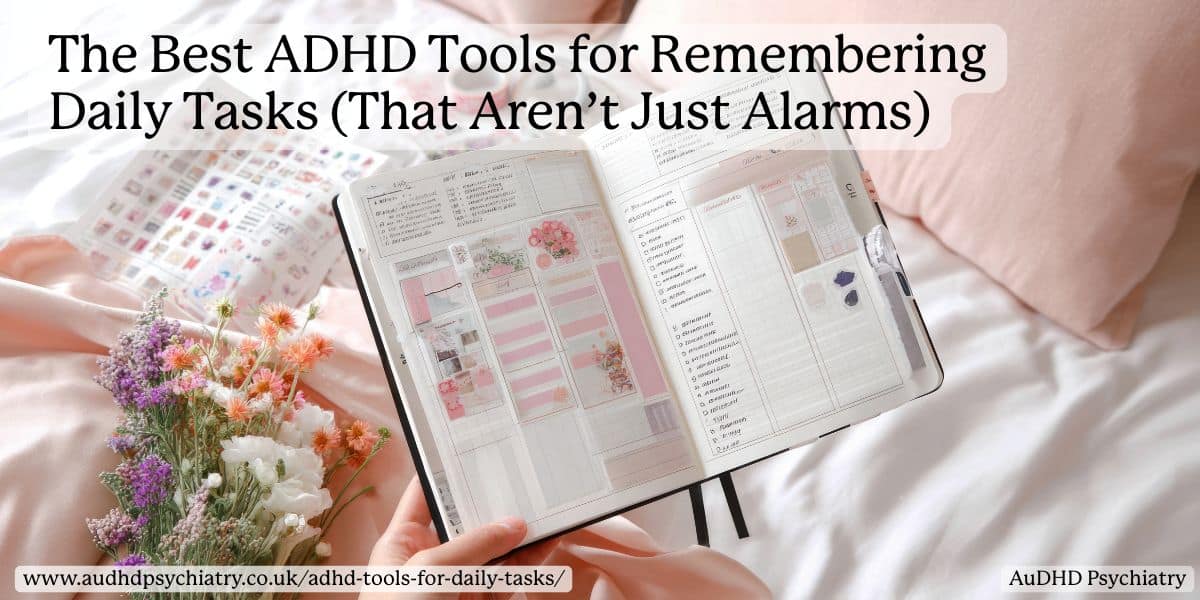

Leave a Reply